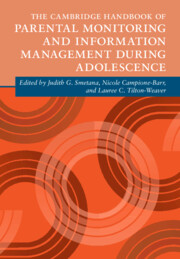Book contents
- The Cambridge Handbook of Parental Monitoring and Information Management during Adolescence
- Cambridge Handbooks in Psychology
- The Cambridge Handbook of Parental Monitoring and Information Management during Adolescence
- Copyright page
- Dedication
- Contents
- Figures and Tables
- Contributors
- Acknowledgments
- Part I History of the Field and Theoretical Frameworks
- Part II Reconsidering Parenting and Parental Knowledge
- Part III Informant and Contextual Differences in Disclosure and Secrecy
- Part IV Applications
- 18 Disclosure in Adolescents and Emerging Adults with Chronic Illness
- 19 Information Management and Adolescent Health
- Index
- References
18 - Disclosure in Adolescents and Emerging Adults with Chronic Illness
from Part IV - Applications
Published online by Cambridge University Press: 12 December 2024
- The Cambridge Handbook of Parental Monitoring and Information Management during Adolescence
- Cambridge Handbooks in Psychology
- The Cambridge Handbook of Parental Monitoring and Information Management during Adolescence
- Copyright page
- Dedication
- Contents
- Figures and Tables
- Contributors
- Acknowledgments
- Part I History of the Field and Theoretical Frameworks
- Part II Reconsidering Parenting and Parental Knowledge
- Part III Informant and Contextual Differences in Disclosure and Secrecy
- Part IV Applications
- 18 Disclosure in Adolescents and Emerging Adults with Chronic Illness
- 19 Information Management and Adolescent Health
- Index
- References
Summary
We review work on disclosure to others about one’s chronic illness condition and challenges in the management of illnesses, focusing on the period of adolescence and emerging adulthood. Adolescents and young adults with a chronic illness who self-disclose to others (beyond parents) that they have a chronic illness are often quite strategic as to how much to disclose and to whom. We then review work on routine disclosures about challenges in the management of chronic illnesses that often occur between parents and adolescents and young adults and romantic partners that can elicit support. We focus our treatment on the illness context of type 1 diabetes, as there is little research on routine disclosure with other illness conditions. We conclude by linking this work to broader models of disclosures for health decisions, recommend that interventions that ease the burden of disclosure may be beneficial, and suggest directions for future research.
- Type
- Chapter
- Information
- The Cambridge Handbook of Parental Monitoring and Information Management during Adolescence , pp. 369 - 387Publisher: Cambridge University PressPrint publication year: 2024

